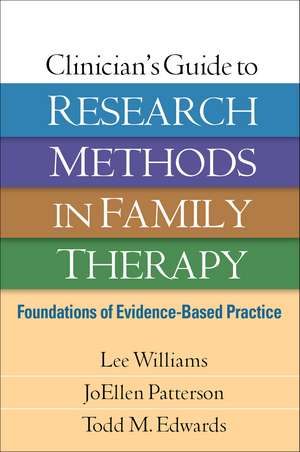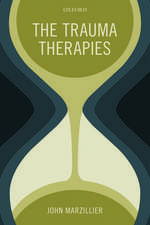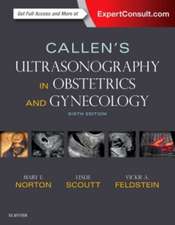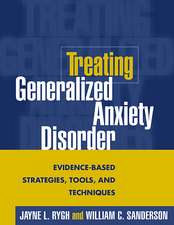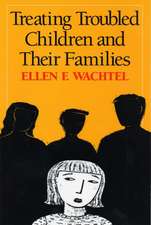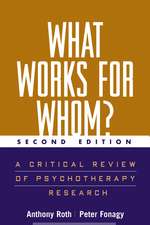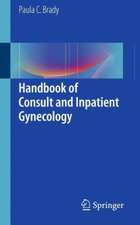Clinician's Guide to Research Methods in Family Therapy: Foundations of Evidence-Based Practice
Autor Lee Williams, JoEllen Patterson, Todd M. Edwardsen Limba Engleză Hardback – 14 iul 2014
A research methods text with a unique focus on evidence-based practice with couples and families, this book bridges the divide between research and clinical work. The text offers comprehensive, user-friendly coverage of measurement and design issues and basic qualitative and quantitative methods. Illustrating research concepts with clinically relevant examples and sample studies, it teaches clear steps for evaluating different types of studies and identifying common threats to validity. Of special value to therapists, it provides a systematic framework for using research to guide the selection and evaluation of interventions that meet the needs of particular clients.
Pedagogical features:
*End-of-chapter "Applications" sections showing how to evaluate specific methods.
*Appendices with quick-reference guides and recommended resources.
*Instructive glossary.
See also the authors' Essential Skills in Family Therapy, Third Edition: From the First Interview to Termination, which addresses all aspects of real-world clinical practice, and Essential Assessment Skills for Couple and Family Therapists, which shows how to weave assessment into all phases of therapy.
Pedagogical features:
*End-of-chapter "Applications" sections showing how to evaluate specific methods.
*Appendices with quick-reference guides and recommended resources.
*Instructive glossary.
See also the authors' Essential Skills in Family Therapy, Third Edition: From the First Interview to Termination, which addresses all aspects of real-world clinical practice, and Essential Assessment Skills for Couple and Family Therapists, which shows how to weave assessment into all phases of therapy.
| Toate formatele și edițiile | Preț | Express |
|---|---|---|
| Paperback (1) | 409.69 lei 3-5 săpt. | |
| Guilford Publications – 23 mai 2018 | 409.69 lei 3-5 săpt. | |
| Hardback (1) | 659.67 lei 6-8 săpt. | |
| Guilford Publications – 14 iul 2014 | 659.67 lei 6-8 săpt. |
Preț: 659.67 lei
Preț vechi: 694.40 lei
-5% Nou
Puncte Express: 990
Preț estimativ în valută:
126.23€ • 132.06$ • 104.86£
126.23€ • 132.06$ • 104.86£
Carte tipărită la comandă
Livrare economică 02-16 aprilie
Preluare comenzi: 021 569.72.76
Specificații
ISBN-13: 9781462515974
ISBN-10: 1462515975
Pagini: 588
Ilustrații: illustrations
Dimensiuni: 152 x 229 x 27 mm
Greutate: 0.54 kg
Ediția:New.
Editura: Guilford Publications
Colecția Guilford Press
ISBN-10: 1462515975
Pagini: 588
Ilustrații: illustrations
Dimensiuni: 152 x 229 x 27 mm
Greutate: 0.54 kg
Ediția:New.
Editura: Guilford Publications
Colecția Guilford Press
Cuprins
1. Learning to Apply Research: Why Bother?
I. Research Foundations
2. Measurement
3. Internal Validity and Experiments
4. External Validity and Sampling
5. Survey Research
6. Qualitative Research
7. Miscellaneous Research Designs
8. Ethics and Values in Research
9. Descriptive Statistics
10. Inferential Bivariate Statistics
11. A Beginner's Guide to Multivariate Statistics
II. Evidence-Based Practice
12. What Is an Evidence-Based Approach?
13. Ask and Acquire: Creating Questions and Conducting a Search
14. Appraise: Reading and Evaluating Research Articles and Systematic Reviews
15. Apply I: Translating Research Findings into Clinical Practice
16. Apply II: Utilizing Couple and Family Therapy Research in Clinical Practice
17. Apply III: How to Talk to Clients about an Evidence-Based Approach
18. Analyze and Adjust: Evaluating Your Clinical Work
19. The Future of Evidence-Based Practice: Looking into the Crystal Ball
Appendix I. Evidence-Based Practice Pocket Guide (the Five A's)
Appendix II. Guide to Evaluating Research Studies
Appendix III. Evidence-Based Practice Resources
Glossary
I. Research Foundations
2. Measurement
3. Internal Validity and Experiments
4. External Validity and Sampling
5. Survey Research
6. Qualitative Research
7. Miscellaneous Research Designs
8. Ethics and Values in Research
9. Descriptive Statistics
10. Inferential Bivariate Statistics
11. A Beginner's Guide to Multivariate Statistics
II. Evidence-Based Practice
12. What Is an Evidence-Based Approach?
13. Ask and Acquire: Creating Questions and Conducting a Search
14. Appraise: Reading and Evaluating Research Articles and Systematic Reviews
15. Apply I: Translating Research Findings into Clinical Practice
16. Apply II: Utilizing Couple and Family Therapy Research in Clinical Practice
17. Apply III: How to Talk to Clients about an Evidence-Based Approach
18. Analyze and Adjust: Evaluating Your Clinical Work
19. The Future of Evidence-Based Practice: Looking into the Crystal Ball
Appendix I. Evidence-Based Practice Pocket Guide (the Five A's)
Appendix II. Guide to Evaluating Research Studies
Appendix III. Evidence-Based Practice Resources
Glossary
Notă biografică
Lee Williams, PhD, LMFT, is Professor in the Marital and Family Therapy Program at the University of San Diego. His research interests include family therapy training, marriage preparation, and couples with religious differences. Dr. Williams is coauthor (with JoEllen Patterson, Todd M. Edwards, et al.) of Essential Skills in Family Therapy, Third Edition, and Essential Assessment Skills for Couple and Family Therapists.
JoEllen Patterson, PhD, LMFT, is Professor in the Marital and Family Therapy Program at the University of San Diego. She is also a voluntary Clinical Associate Professor in the Divisions of Family Medicine and Global Health as well as the Department of Psychiatry at the University of California, San Diego, School of Medicine. She serves on the editorial boards of Families, Systems, and Health and the Journal of Marital and Family Therapy. Dr. Patterson is coauthor (with Todd M. Edwards et al.) of The Therapist's Guide to Psychopharmacology, Revised Edition. Her Fulbright Scholarships have allowed her to work in Norway, New Zealand, Hong Kong, and elsewhere.
Todd M. Edwards, PhD, LMFT, is Professor and Director of the Marital and Family Therapy Program at the University of San Diego, and provides individual and family therapy in the Division of Family Medicine at the University of California, San Diego, School of Medicine. His research and teaching interests focus on the integration of family-oriented mental health services into primary care settings; family therapy training; and male friendship in adulthood. He is Associate Editor of Families, Systems, and Health.
JoEllen Patterson, PhD, LMFT, is Professor in the Marital and Family Therapy Program at the University of San Diego. She is also a voluntary Clinical Associate Professor in the Divisions of Family Medicine and Global Health as well as the Department of Psychiatry at the University of California, San Diego, School of Medicine. She serves on the editorial boards of Families, Systems, and Health and the Journal of Marital and Family Therapy. Dr. Patterson is coauthor (with Todd M. Edwards et al.) of The Therapist's Guide to Psychopharmacology, Revised Edition. Her Fulbright Scholarships have allowed her to work in Norway, New Zealand, Hong Kong, and elsewhere.
Todd M. Edwards, PhD, LMFT, is Professor and Director of the Marital and Family Therapy Program at the University of San Diego, and provides individual and family therapy in the Division of Family Medicine at the University of California, San Diego, School of Medicine. His research and teaching interests focus on the integration of family-oriented mental health services into primary care settings; family therapy training; and male friendship in adulthood. He is Associate Editor of Families, Systems, and Health.
Recenzii
"Williams, Patterson, and Edwards have created a resource where none existed before--an accessible book about research for practitioners and students working with couples and families. The first part of the book provides a wonderfully succinct primer on research methods; the second part treads previously unexplored territory by offering an entrée into evidence-based practice. The volume guides readers to the essential information they need about research: what it is, how to find and appraise it, how best to incorporate evidence-based methods into practice, and how to evaluate clients' progress. This book should become the core research methods text for master's-level programs in marital and family therapy, counseling, and psychology."--Jay L. Lebow, PhD, ABPP, LMFT, Senior Scholar and Clinical Professor, The Family Institute at Northwestern University
"Ideally suited for students and therapists invested in learning more about the research process in order to be optimally effective clinicians. This reader-friendly text, written by leaders in the marital and family therapy field, brings research to life in a way that is engaging, comprehensible, and clinically applicable. By mastering effective strategies for integrating state-of-the-art research into practice, clinicians at all stages of development will find their psychotherapeutic endeavors and outcomes enhanced enormously."--Nadine J. Kaslow, PhD, ABPP, Department of Psychiatry, Emory University; past president, American Psychological Association
-A helpful and useful set of appendices are provided, in particular the Pocket Guide. I found the glossary especially helpful….By providing the information in a clear, logical, and methodical way the authors have opened a door for seasoned as well as new clinicians to apply evidence-based practice.--Child and Family Behavior Therapy, 1/18/2017ƒƒA user-friendly text that is ideal for MFT master's students. The writing is clear, organized, and approachable with as many examples as there are key terms. Most importantly, this book does not teach students how to conduct research; rather, it teaches them how to critically consume it….This book is expressly written and best used for a master's level MFT research methods course. However, any clinician with an interest in connecting research to their practice could benefit directly from the text. My own students agree that this book is straightforward, informative, and directly applicable to their work as MFTs. Finding this book has restored much of the original joy I experienced at the opportunity to teach research methods.--Journal of Marital and Family Therapy, 4/1/2016ƒƒThis book is already becoming a classic on research methods for marriage and family therapy students. In addition to providing students with basic research methods concepts, ethics, and some specifics of conducting research with couples and families, the authors do an excellent job of advocating for evidence-based practice as well as educating clinicians about evaluating and implementing research findings in practice. This is an excellent and much needed work on research methods for master's-level students in marriage and family therapy.--Doody's Review Service, 9/1/2014ƒƒThe first section of the text is dedicated to research methodology infused with clinical applications. The authors remain consistently true to their intent to help the reader become an informed consumer of counseling research. The second section of the book builds a thoughtful understanding of evidence-based practice….The authors have included three helpful appendices, which summarize the steps of practice, the guide to evaluating research studies, and practice resources. They even provide a glossary of research 'lingo' to help the reader better understand the content without reference to another source.--The Family Journal, 7/21/2015"Ideally suited for students and therapists invested in learning more about the research process in order to be optimally effective clinicians. This reader-friendly text, written by leaders in the marital and family therapy field, brings research to life in a way that is engaging, comprehensible, and clinically applicable. By mastering effective strategies for integrating state-of-the-art research into practice, clinicians at all stages of development will find their psychotherapeutic endeavors and outcomes enhanced enormously."--Nadine J. Kaslow, PhD, ABPP, Department of Psychiatry, Emory University; past president, American Psychological Association
Descriere
A research methods text with a unique focus on evidence-based practice with couples and families, this book bridges the divide between research and clinical work. The text offers comprehensive, user-friendly coverage of measurement and design issues and basic qualitative and quantitative methods. Illustrating research concepts with clinically relevant examples and sample studies, it teaches clear steps for evaluating different types of studies and identifying common threats to validity. Of special value to therapists, it provides a systematic framework for using research to guide the selection and evaluation of interventions that meet the needs of particular clients.
